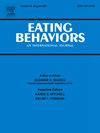感知压力、正念饮食、成瘾性饮食行为和成人体重指数之间的关系:探索性别特定途径
IF 2.4
3区 医学
Q2 PSYCHIATRY
引用次数: 0
摘要
本研究主要旨在探讨感知压力(PS)与类成瘾饮食行为(AEB)之间的关系,并重点关注正念饮食(ME)在这一关系中的作用。该研究还旨在分析这些关系对身体质量指数(BMI)的间接影响,同时探索可能的性别差异。本横断面研究利用多组路径分析来检验假设模型,提出PS通过ME直接和间接影响AEB,并与1626名成年人的BMI间接相关。多组分析证实了假设模型对两性都很适合。本研究结果表明,PS通过ME对两性AEB均有显著的正向总效应和间接效应。此外,多组通径分析显示,这些通径系数在女性和男性之间没有统计学上的显著差异。虽然PS对AEB的直接影响仅在女性中显著,但这种直接影响的程度在性别之间没有显著差异。此外,AEB与BMI呈直接正相关,且经ME和AEB从PS到BMI的间接通路在两性中均具有显著性。根据该模型,ME与AEB呈负相关,是对抗PS对AEB和BMI影响的保护因素。因此,促进ME可以作为缓解压力引起的饮食不良行为和减轻体重相关不良后果的双重策略。本文章由计算机程序翻译,如有差异,请以英文原文为准。
The relationships among perceived stress, mindful eating, addiction-like eating behavior, and BMI in adults: Exploring gender-specific pathways
This study primarily aimed to examine the relationship between perceived stress (PS) on addiction-like eating behavior (AEB), with a focus on the role of mindful eating (ME) in this relationship. The study also aimed to analyse the indirect impact of these relationships on body mass index (BMI) while exploring possible gender differences. This cross-sectional study utilized multigroup path analysis to test a hypothesized model, proposing that PS influences AEB both directly and indirectly through ME, and is also indirectly linked to BMI in a sample of 1626 adults. The multigroup analysis confirmed that the hypothesized model exhibited a good fit for both genders. The findings of the study demonstrated that PS had a significant and positive total and indirect effect on AEB through ME in both genders. Furthermore, multigroup path analyses revealed that there were no statistically significant differences in these path coefficients between females and males. While the direct effect of PS on AEB was only significant in females, the magnitude of this direct effect did not differ significantly between genders. In addition, AEB demonstrated a direct and positive association with BMI, and the indirect pathways from PS to BMI via ME and AEB were found to be significant in both genders. According to the model, ME is negatively associated with AEB and serves as a protective factor against the effects of PS on both AEB and BMI. Consequently, promoting ME may serve as a dual strategy to alleviate stress-induced maladaptive eating behaviors and mitigate weight-related adverse outcomes.
求助全文
通过发布文献求助,成功后即可免费获取论文全文。
去求助
来源期刊

Eating behaviors
Multiple-
CiteScore
4.20
自引率
3.60%
发文量
65
审稿时长
60 days
期刊介绍:
Eating Behaviors is an international peer-reviewed scientific journal publishing human research on the etiology, prevention, and treatment of obesity, binge eating, and eating disorders in adults and children. Studies related to the promotion of healthy eating patterns to treat or prevent medical conditions (e.g., hypertension, diabetes mellitus, cancer) are also acceptable. Two types of manuscripts are encouraged: (1) Descriptive studies establishing functional relationships between eating behaviors and social, cognitive, environmental, attitudinal, emotional or biochemical factors; (2) Clinical outcome research evaluating the efficacy of prevention or treatment protocols.
 求助内容:
求助内容: 应助结果提醒方式:
应助结果提醒方式:


